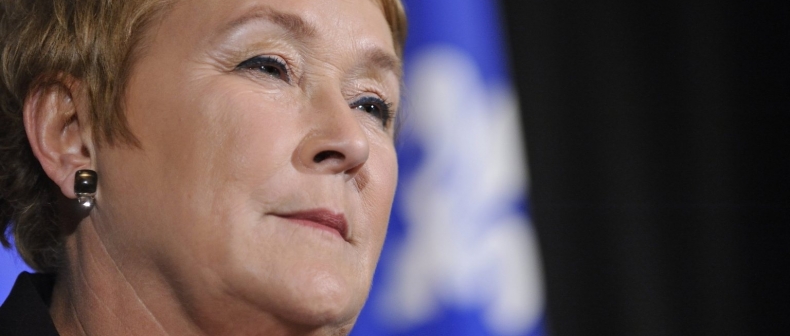
The problem with Quebec’s Charter of Values isn’t how cynically Premier Pauline Marois is pandering to a racist past. Sure, religious groups are justifiably offended by the proposed interference of the state in their personal choices, fashion or otherwise. One could even argue the Charter as outlined smacks of borderline totalitarianism in its heavy-handed dictation of social mores. Any of these perspectives might ignite fervent opposition to the Charter. But they’re not the real problem.
The real problem is that the Parti Quebecois is cowardly.
They could have stopped with the declaration that burkas and niqabs are unacceptable and allowed fulsome debate to take place. It’s another thing entirely to widen the net and play the race and religion card for votes. By tossing kippahs, hijabs, turbans, and big honking crosses into the mix, the PQ have muddied the waters not only for Quebec but for the rest of Canada. Keep in mind that this message is coming from a nationalist political party which has stumped with concepts like de souche, pur laine, and un peuple.
Take a hard look at places in the world where fundamentalist forces push female garb like the burka and ask yourself whether those societies share the values espoused by the people of Quebec or Canada. Contrast that with communities (here and abroad) where people wear hijabs or kippahs or turbans. Are their values really so different? Do expressions of religious affiliation or cultural belonging threaten anyone? Are they somehow more menacing than hipsters donning plaid or Goths dying their hair black? What about teens who discover a predilection for tattoos and creative piercings? Religious or secular, these are matters of personal taste or belief.
A free, open, tolerant society does not force its citizens to live in fear of stoning or lashing or having acid thrown in one’s face because of their clothing. It doesn’t insist its people wear dog collars or sack cloth or otherwise demean themselves or erase their existence. Neither does it tell them they can’t do any of those things, if that’s what turns their crank. But it does get involved when people are subjected to pressure to conform. That becomes harder to do when critical discourse about a purportedly religious custom is labeled rascist.
And that is where the PQ’s gambit starts to smell bad.
On its Web site, the Quebec government presents a timeline of Quebec values as enacted over the last 50 years. They include giving married women full legal capacity, the decriminalisation of contraception, abortion, and homosexuality, and legislating gender equality. To outlaw symbols of misogynistic oppression would fit right in on a list like that. The subjugation of religious attire does not.
If there is any doubt what game Premier Marois is playing, one need only look at her comments in Le Devoir on September 6th. Part of the roll-out of the PQ’s Charter initiative, this was hardly a laid-back conversation peppered with idle remarks. In it, she slipped in the bit about terrorism in jolly old England, laying the blame squarely on failed multiculturalism.
The very next day, she apologized, after a fashion. Where was the backpedaling, the scrambling, the dodging one might expect when asked to articulate what the premier meant by her over-the-top assertion? What we got instead was an immediate retraction. Result? The party faithful heard her original message. They know where their leader stands when it comes to les maudits Anglais. The very fact she had to retract her slur so quickly gave it all the more heft. After all, wasn’t it the English media who forced her apology? Les maudits btards, estis.
With that same statement, Marois tied religious garb to terrorism in a brazen attempt to fan the flames of fear among rural voters. It came across as a bit of a reach, but she is hardly the first separatist leader to treat Quebec voters as unsophisticated. In the dying days of the 1995 referendum, faced with the argument of economic challenges hobbling an independent Quebec, Lucien Bouchard told a cheering crowd: sovereignty “has something magical about it. With a wave of the wand, it transforms the whole situation.” When will Quebec’s nationalist leaders treat their flock with the respect they deserve?
Speaking of respect, the PQ does defer to the cross, at least. Like the big (beautiful) one on Mont Royal. And the austere one that hangs behind the speaker’s throne in the Quebec National Assembly. Or the delicate gold ones hanging around the necks of many of the very voters with whom they seek to curry favour. You don’t have to be a practicing Catholic to be a real Quebecker, they seem to say. You just have to acknowledge that your grandparents were. It’s our history, after all.
So, what are we to expect now? Given the example of Quebec’s language police running around measuring English signage, will we see cultural agents handing out tickets to public sector workers who don their kippahs while still in the ministerial parking lot? Sound absurd? Keep in mind, this is the government which tells Italian restaurant owners they can’t call pasta pasta.
A more charitable reflection on the PQ’s Charter might be to suggest that they are simply attempting to be politically correct. Rather than singling out articles of clothing designed to hide women, perhaps they widened their discriminatory net to avoid pointing the finger at the one thing that might unite more voices under their umbrella. Burkas and niqabs are more than simple assertions of religious belief. At the very least, they are worthy of discussion in a free and open society that trumpets gender equality. By tangling them up with innocuous religious symbols, the PQ has put them out of bounds, potentially rendering debate on an important topic taboo.
In Quebec last week to announce the creation of an aeronautics plant which will supply a French company, France’s finance minister, Pierre Moscovici, with Premier Marois at his side, had the following to say: “Secularism also means tolerance. Everyone, in their private space, can practice or not practice (their faith). Secularism is what preserves the public space.” It was almost funny watching a French politician tiptoe around the risk of committing a de Gaulesque faux pas, insisting it wasn’t his place to tell people what to do (apart from what clothes the French should wear in public, of course). But Marois has indicated a leaning toward the French model, imperfect as it is. And taken to its extreme, that should concern everyone, religious or not.
If people are only free to wear religious garb in their private spaces, what prevents the state–the so-called tolerant secular state–from outlawing other forms of dress (or undress) in public space. Forbidding faith-based articles of clothing is the opposite of tolerant. It rather smacks of darker intent. Should Orthodox Jewish sidecurls be outlawed as well? How about the beards favored by Muslim men? Or soul patches? (Heck, I’ll vote for that.)
And what about Quebeckers who choose not to set aside their religious attire? The effect of the Charter will be to create a second class of citizens. There will be those who can work for the government and those who cannot. There will be the Us and there will be the Them. Is that what is meant by secular tolerance?
Ethnic nationalism may not be the PQ’s intent, but they’re playing a dangerous hand. Cultural intolerance is behind many of the atrocities the world has witnessed over the last few decades. That’s what makes Marois’s political trickery particularly nasty. Instead of engendering serious conversation about accommodation, about women’s rights, and about secular values, she has attempted to light a polarizing fire of hate. Snuffing out the fire shouldn’t be all that difficult. It’s a rather vain Hail Mary, after all. It’s doubtful most Quebecois, even the most fiercely nationalist, will be taken in. Further, where support for the Charter of Values is grounded in the challenges of accommodation regarding some of the more fundamentalist beliefs, practices, and strictures of Islamists or others, concerns can and should be heard and addressed at the community level.
The problem is, in dousing the fire she seeks to ignite, we risk extinguishing an opportunity to discuss what our real values are when it comes to the way isolated groups treat their own members, be those groups religious or cultural. A sad price to pay for political gain.
____
Rob Brunet is a Toronto-based crime fiction author whose French Canadian bloodline runs nearly 400 years deep. Follow him online at @RRBrunet or www.robbrunet.com
For more, follow us on Twitter @TorontoStandard and subscribe to our newsletter.














